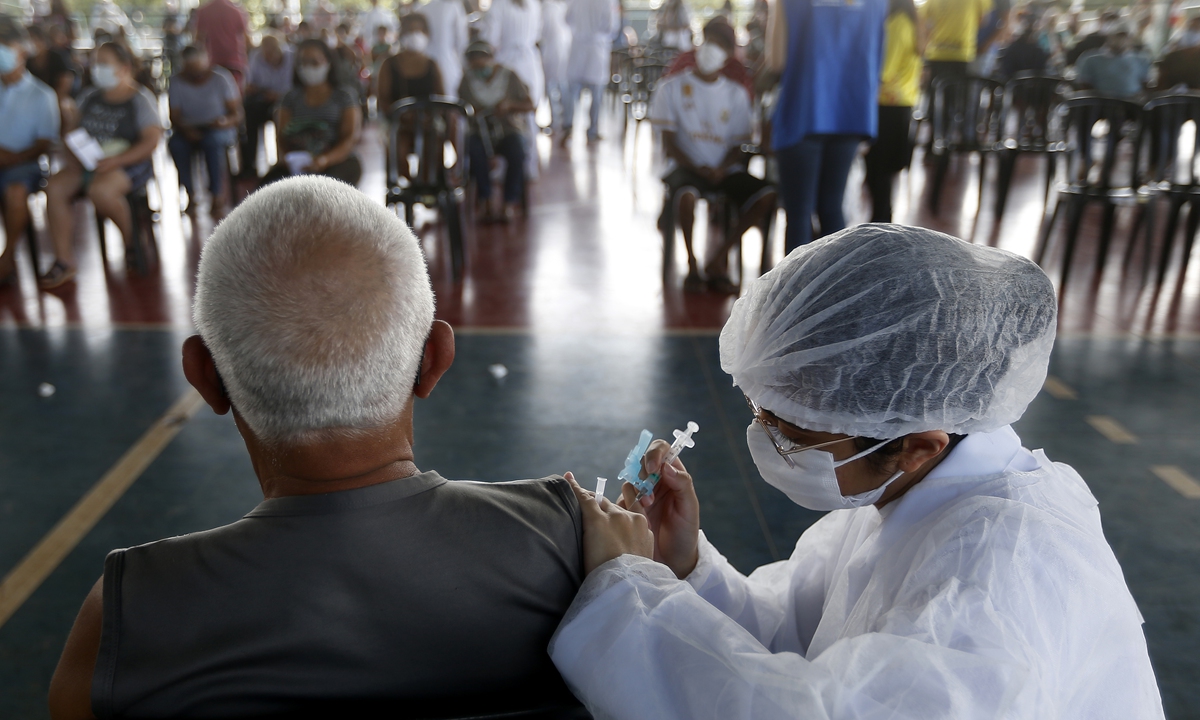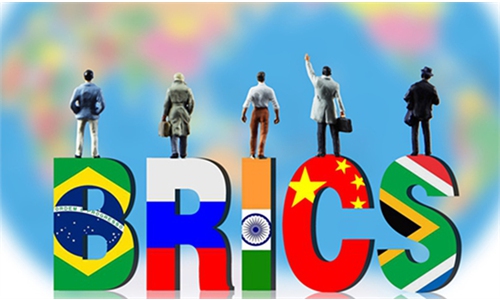IN-DEPTH / IN-DEPTH
BRICS vaccine cooperation boosted as two of three WHO-approved Chinese shots are co-produced with member states

A man receives China-made COVID-19 vaccine in Brasilia, Brazil. File Photo: Xinhua
The COVID-19 shot of Chinese vaccine producer Sinovac has been widely introduced in Brazil and South Africa through local production and approval, whereas CanSinoBIO's adenovirus vector COVID-19 vaccine, another Chinese frontrunner, has conducted Phase III clinical trials in Russia.
The BRICS Vaccine Research and Development (R&D) Center was officially launched in an online ceremony on March 22, marking a step closer to joint vaccine research and plant construction, authorization of local production, and mutual recognition of standards.
At the opening ceremony, the five BRICS countries jointly proposed an initiative to strengthen vaccine cooperation to ensure the accessibility and affordability of shots in developing countries through their equitable distribution as global public goods. It placed special emphasis on openness and welcomed more partners to join.
The R&D center will also cooperate with universities, scientific research institutions, health and disease control institutions and industries to monitor epidemics and virus variations, promote vaccine research and industrialization, and explore strategies for vaccine application.
South African President Cyril Ramaphosa recently stated that the country views the BRICS Vaccine Research and Development Centre as a valuable development in its efforts to strengthen vaccine manufacturing capacity in South Africa and on the African continent more broadly. South Africa will be calling on its BRICS partners to continue to support the principle that vaccines destined for Africa should be produced on the continent.
The South African president made the remarks on Monday in the latest edition of his weekly newsletter. He and other BRICS heads of state will virtually converge for the 14th BRICS Summit this year.
China's vaccine developer Sinovac is leading the Chinese branch of the BRICS vaccine research and development center, a joint vaccine cooperation effort by the five BRICS countries.
Sinovac has coordinated with Brazil's state-owned Butantan Institute and South Africa's partner on fruitful COVID-19 vaccine development in a bid to increase local production.
Sinovac has supplied nearly 2.9 billion doses of COVID-19 vaccines to China and the world, including 140 million doses to Brazil made up by 40 million doses of finished product and 100 million locally produced semi-finished jabs.
The producer told the Global Times on Tuesday that their self-developed Omicron-specific shots are under clinical trials in East China's Jiangsu Province and will start clinical trials in Hong Kong afterwards. The vaccine is ready for large-scale production and is expected to be exported to African countries hit by the Omicron variant if required.
Persistently low vaccination rates in Africa and other developing countries unfortunately increase the risk of new variants emerging and spreading with potentially disastrous consequences. It is against this background that the launch of the BRICS Vaccine Research and Development Centre is particularly welcomed, Gert Grobler, a former senior South African diplomat, told the Global Times.
The African Union (AU) has been pushing for African countries to develop their own vaccine manufacturing capacity after the pandemic highlighted the dangers of depending on vaccine imports. The AU has also called on African countries to step up their vaccination efforts because currently only 18 percent of the African population has been fully vaccinated and there still remains a strong apathy among people on the continent to be vaccinated, Grobler suggested, anticipating a huge potential for future BRICS cooperation in joint production of vaccines and other pharmaceutical products.
The important collaboration among BRICS members in the area of health and, in response to the COVID-19 pandemic in particular, has placed the BRICS countries and the developing world in a better position to respond effectively to the current and future health emergencies, Grobler said.
Vaccine cooperation between China and South Africa under the BRICS framework has not only brought health to the African people, but also helped to create jobs and develop the economy in the continent, and ultimately make "vaccines made in Africa" a reality, Hilton Klein, CEO of Numolux, Sinovac's partner in South Africa, told Xinhua News Agency.
The Phase III trial of Sinovac's vaccine in 4,500 patients aged 6 months to 17 years in South Africa demonstrated good safety and effectiveness in minors, especially in children aged 6 months to 3 years, opening the possibility of using the vaccine to cover the least immunized population.
Previously, the large-scale Phase III clinical trial of the vaccine in 12,000 medical workers in Brazil also confirmed promising safety and effectiveness, which was later recognized by many countries' drug regulatory authorities and was approved for conditional marketing in China and emergency use in more than 60 countries and regions worldwide.
In a real-world study conducted in Serrana, in the Brazilian state of Sao Paulo, immunization with Sinovac's shot reduced COVID-19 hospitalizations and deaths in the city by 95 percent, data show. The jab has also been shown to be safe in 250,000 pregnant women vaccinated in Brazil, with a lower incidence of adverse events than other types of COVID-19 vaccines.
Sinovac's locally-produced shots, in collaboration with the local state-owned Butantan Institute, have so far delivered more than 140 million doses to the Brazilian population, widely supporting Brazil's epidemic response.
BRICS countries are committed to uphold multilateralism and enhanced cooperation can effectively heighten the voice of developing countries in the international arena. At present, the impact of protectionism, unilateralism and COVID-19 has made international cooperation difficult, which highlights the importance of the BRICS cooperation mechanism, Ana Garcia, the general coordinator of the BRICS policy center, told the Global Times.
The COVID-19 pandemic was a clear sign that Africa's safety and health are not a priority for the West where countries chose to hoard much-needed vaccines. However, China stepped in donating vaccines and personal protective equipment to developing countries most in need, Mark Allan, a young Kenyan media professional, told the Global Times on Wednesday.
Blade Nzimande, South Africa's Minister of Higher Education, Science and Technology, said on March 22 that The BRICS Vaccine Research and Development Center should also explore the use of new technologies, such as artificial intelligence and big data, to help countries improve their scientific capabilities to prevent and tackle global health challenges.


